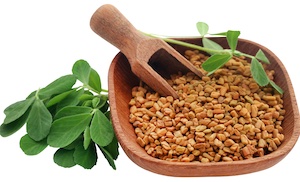Fenugreek, scientifically known as Trigonella foenum-graecum, is an annual plant in the family Fabaceae, characterized by its distinct aromatic and pungent seeds. The fenugreek plant typically stands about 0.3-0.9 meters high. It consists of a robust stem and trifoliate leaves, with each leaflet being oblong-ovate, approximately 2-5 cm long. The leaves are green, with a smooth texture and a characteristic pleasant smell. The plant develops white or yellowish flowers, each with a single carpel and ten stamens, followed by fruit pods or legumes. These pods are elongated, thin, and pointed, measuring 10-15 cm long, with a slender, beak-like tip. Each pod encloses 10-20 seeds, which are hard, brownish, and cuboid, renowned for their intense aroma and bitter flavor. These seeds are the most commonly used part of the plant, utilized in both culinary and medicinal applications. Methi is known as “methika” in ayurveda.
Methi for Diabetes
Fenugreek, an herb with aromatic seeds, has been found to possess numerous health benefits, especially for those living with diabetes. The seeds contain a unique type of soluble fiber, galactomannan, which has the ability to slow down the rate of digestion and absorption of sugars. This, in turn, can regulate blood sugar levels, making it beneficial for managing diabetes.
Furthermore, the seeds are abundant in an amino acid called 4-hydroxyisoleucine, which can promote the production of insulin when blood sugar levels are elevated. Thus, fenugreek can both regulate the amount of sugar that enters the bloodstream and improve the body’s response when blood sugar levels rise.
Clinical studies have provided evidence supporting these benefits. For instance, a randomized, controlled trial published in the International Journal for Vitamin and Nutrition Research in 2009 revealed that daily supplementation of fenugreek seeds significantly lowered fasting blood glucose and improved glucose tolerance in type 2 diabetes patients.
The herb can be incorporated into the diet in various forms – as whole seeds, a powder, or an extract. As with any supplement, it should be taken under the guidance of a healthcare provider, to ensure it is safe and effective for individual health needs.
When this herb is used along with other herbs like Jamun Fruit, haritaki, amla, gudmar and Vijaysar , it effectively helps in the management of blood sugar levels. Moolika Ayurveda Diasol Capsules for Diabetics contain all these herbs and it is the best ayurvedic medicine for diabetes.
Methi for Weight Loss
Weight management is a prevalent health concern, and natural remedies like fenugreek (known as methi) are gaining recognition for their potential benefits. The herb’s power for weight control lies in its rich composition of dietary fibers and a unique natural compound called 4-hydroxyisoleucine. These fibers add bulk to the diet, reducing the absorption of carbohydrates and fats, and thus, calorie intake. They also give a feeling of fullness that can help suppress overeating or unhealthy snacking.
The 4-hydroxyisoleucine has been studied for its role in enhancing insulin sensitivity, which in turn regulates blood sugar levels and reduces the tendency of the body to store excess sugars as fat. Additionally, the galactomannan, a water-soluble fiber in the herb, slows down the rate of sugar absorption into the bloodstream, which helps to control cravings and overeating.
Furthermore, methi seeds have been found to increase the metabolic rate of the body, thus accelerating the fat-burning process. With regular intake, this herb could provide a natural and holistic approach to managing weight effectively. However, like any other weight loss strategy, incorporating this herb into your diet should be done alongside maintaining a balanced diet and regular exercise.
Methi for Skin and Hair
Fenugreek, known as “methi” in Hindi, is a powerhouse of health benefits, including for skin and hair. This humble plant, both in seed and leaf form, is packed with vital vitamins and minerals, including vitamins A, C, and K, folic acid, and potassium. It also contains a variety of phytonutrients that contribute to its beneficial properties.
For the skin, it serves as an effective natural remedy. It is anti-inflammatory, which can help in reducing skin redness, acne, and other similar conditions. The natural oils in the seeds moisturize the skin, preventing dryness and promoting a healthy, glowing complexion. Fenugreek seeds can be used in face masks to cleanse the skin and exfoliate dead skin cells, rejuvenating the skin.
When it comes to hair care, it can help in controlling hair fall and promoting hair growth. Its rich protein content helps in strengthening the hair from the roots, and its lecithin content hydrates the scalp and makes hair smooth and shiny. The seeds can be soaked overnight, then ground into a paste and applied to the hair, or infused in oil and used for massaging the scalp. Regular use of this wonder plant promotes a healthy scalp and luscious hair.
Ayurveda Medicinal Properties of Methi
Methika, also known as fenugreek or methi, holds a special place in Ayurvedic medicine due to its many therapeutic properties.
In terms of the Ayurvedic principle of Doshas, Methika is known to balance Vata and Kapha, but can potentially increase Pitta if consumed in excess due to its Ushna (hot) potency. Its principal taste or ‘Rasa’ is categorized as Tikta (bitter) and Katu (pungent), which contributes to its effectiveness in balancing Vata and Kapha.
The Veerya, or potency, of Methika is Ushna, implying that it has a warming effect on the body. This property aids in stimulating the body’s metabolic processes and is useful in conditions like cough and cold.
In terms of Vipaka, the post-digestive effect, Methika has a Katu (pungent) Vipaka. This influences the final impact of the herb on the body after digestion, enhancing its digestive and metabolism-boosting properties.
Regarding Guna, Methika is considered Laghu (light) and Rooksha (dry), helping in digestion and reducing excess Kapha.
Medicinally, Methika is renowned for its potent anti-inflammatory, anti-diabetic, and galactagogue properties. It aids in digestive ailments, helps manage diabetes by reducing blood sugar levels, stimulates lactation in nursing mothers, and has been used to alleviate menstrual and menopausal symptoms. Moreover, its high fiber content assists in weight management and its antioxidant properties contribute to overall well-being.
However, like any medicinal herb, it’s essential to use Methika in appropriate quantities and under expert guidance to avoid potential side effects.
Reference:
Gupta A, Gupta R, Lal B. Effect of Trigonella foenum-graecum (fenugreek) seeds on glycaemic control and insulin resistance in type 2 diabetes mellitus: a double blind placebo controlled study. Int J Vitam Nutr Res. 2001;71(6):323-6. doi: 10.1024/0300-9831.71.6.323. PMID: 11868855.
Srichamroen, A., Thomson, A. B. R., Field, C. J., & Basu, T. K. (2009). In vitro intestinal glucose uptake is inhibited by galactomannan from Canadian fenugreek seed (Trigonella foenum graecum L) in genetically lean and obese rats. Nutrition Research, 29(1), 49-54.
Kumar, V., Sinha, A. K., Makkar, H. P. S., & Becker, K. (2012). Dietary roles of phytate and phytase in human nutrition: A review. Food Chemistry, 133(4), 1303-1315.


